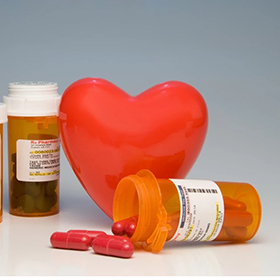
The human stomach, when healthy, is not a suitable host for micro-organisms, but in pathological conditions such as gastritis, when gastric acid secretion is impaired, microbial overgrowth can be observed. The use of gastric acid suppression drugs has been shown to have profound effects on the microbiome.[1] Acid-blocking drugs, or proton pump inhibitors (PPIs) used for gastroesophageal reflux disease (GERD) to reduce gastric acid secretion, are among the most commonly prescribed medications in the world with approximately 6%–15% of the general population receiving acid suppression therapy.[2] Once initiated, they are often used for long periods of time without question,[3] despite the guidelines saying “for short term use only.”
PPIs increase the stomach pH to make it less acidic,[4] which is what they are designed to do, and as a result, change the composition of the intestinal microbiota[5] and impact the pH of the rest of the gut. They are associated with a decrease in small bowel beneficial Bifidobacteria and increase in the toxic gram-negative bacteria, as well as being associated with a significant decline in microbial diversity within seven days of beginning therapy.[6]
PPIs dramatically increase the risk of stomach bacterial overgrowth (SBO) and small intestinal bacterial overgrowth (SIBO), with increased risk of these bacteria getting into the blood[7] and the potentially fatal infection, Clostridium difficile.[8] Bifidobacteriaceae, important and beneficial bacteria of human gastrointestinal microbiota, can over-colonise the stomach of people with low stomach acid. Bifidobacteriaceae species, typically found in the oral cavity, readily colonise the low acid stomach[9] and become good bacteria but in the wrong place as a result of altered pH.
Proton pump inhibitors also promote progression of both alcoholic and non-alcoholic fatty liver disease in mice and contribute to the increasing incidence of chronic liver disease as a result of dysbiosis.[10] The list of side effects for PPIs is extensive, serious and even life-threatening and they are all mediated through the gut.
A growing number of studies are showing connections between autoimmune conditions linked with dysbiosis, including antibiotics and the use of protein pump inhibitors (PPIs) in controlling gastric reflux.[11] The use of PPIs can potentially create far greater problems in the long run.
[1] Krezalek et al., 2016; Mackenzie et al., 2017.
[2] Johansen et al., 2014.
[3] Reimer and Bytzer, 2009.
[4] O’May et al., 2005.
[5] Bajaj et al., 2014; Imhann et al., 2016; Jackson et al., 2016.
[6] Seto et al., 2014; Wallace et al., 2011.
[7] Choung et al., 2011.
[8] Lo and Chan, 2013; Janarthanan et al., 2012.
[9] Mattarelli, 2014.
[10] Llorente et al., 2017; Reveles et al., 2017.
[11] Andresson et al., 2016.